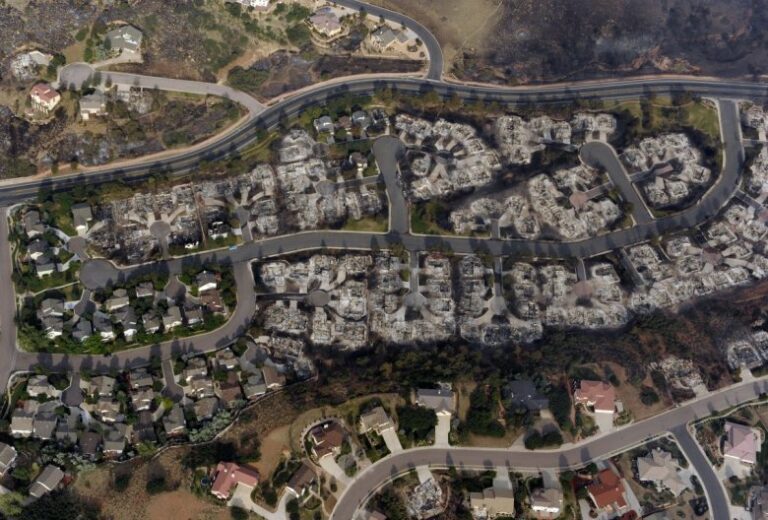Colorado Bill Seeks to Reduce Wildfire Risk, Home Insurance Costs
A bill backed by Colorado Gov. Jared Polis and several Democratic lawmakers proposes that utilities invest in a program aimed at lowering home insurance costs. The program would also reduce the utilities’ financial liability for causing wildfires.
The legislation, House Bill 1302, would allocate up to $100 million every five years – funded through bonds – to purchase reinsurance for home insurers. Reinsurance acts as insurance for insurance companies, providing financial backing in the event of significant losses, such as those arising from natural disasters.
This approach intends to mitigate the financial risks faced by private insurers and, consequently, lower the home insurance premiums paid by Coloradans. Supporters also hope the measure will prevent insurers from leaving the state, which has caused a rise in premium costs.

The concept draws inspiration from a similar program in the health insurance sector in Colorado, which has been credited with helping to reduce costs, though with certain caveats. “This is something that we’ve been doing in health insurance for a number of years,” said Rep. Kyle Brown, a Louisville Democrat and one of the bill’s lead sponsors. “We need to make sure that we have a similar approach here so that when we have these giant spikes and losses in a given year, there’s a backstop by the state that would pay.”
However, insurers are voicing opposition to the proposal, calling it a first-in-the-nation concept that could further destabilize Colorado’s already fragile home insurance market. They also point out the fundamental differences between health and home insurance.
“It doesn’t make financial sense to us,” said Carole Walker, leader of the Rocky Mountain Insurance Information Association, an industry trade group. “It’s complex. It’s confusing. So much of it is based on what we think are un-actuarially sound principles. We have major concerns.”
One major concern for insurers involves how the bill would impose fees if the reinsurance fund lacks sufficient funds to cover reinsurance premiums.
Polis views the measure as crucial to his wildfire policy goals. “I think it can be a win-win for everybody,” Polis stated recently. “There are currently Coloradans that only have access to one insurance product for their home or are being cut off altogether. By reducing risk through reinsurance — a distinct but similar approach to what we took in health care and helped reduce rates — we feel this can help put downward pressure” on the home insurance market.
Key Concerns and Uncertainties
The details of House Bill 1302 are subject to change, with sponsors anticipating significant revisions during its initial hearing in early April. According to Brown, utilities have expressed some apprehension about the bonding mechanism, which is currently defined somewhat vaguely within the measure. Utilities are currently neutral on the measure.
Xcel Energy, Colorado’s largest utility, has faced blame from officials for the 2021 Marshall fire, the state’s most destructive wildfire. The company denies responsibility. It has stated it needs to spend $1.9 billion to prevent future blazes, which is roughly the same amount as the estimated damage from the Marshall fire.

Power companies in California have been repeatedly blamed for starting large wildfires. The bill would prevent utilities participating in the wildfire reinsurance program from passing the bond costs onto their customers, while, in exchange for purchasing the bonds, an insurer would not be able to hold the utility financially liable for starting a wildfire.
Insurers object to House Bill 1302 for various reasons, including concerns about the $100 million being insufficient. They also worry about being compelled to offer policies in high-risk areas. The most significant complaint is a clause that would require insurers to lower rates when no more than 75% of their revenue is used for insured payouts over a three-year period, known as a loss ratio.
“A three-year window isn’t long enough to observe that long-term average of wildfire or weather events,” Walker said. Additionally, companies maintain capital reserves to maintain solvency.
House Speaker Julie McCluskie, a Dillon Democrat and another lead sponsor of House Bill 1302, noted that loss-ratio regulations have been applied in the health insurance market, and she is open to collaborating with home insurers to reach a mutually agreeable solution.
Hail Mitigation Measures
Hail damage is a significant driver of home insurance expenses in Colorado, and House Bill 1302 seeks to address this by imposing a fee of up to 1.5% on insurers for every home insurance policy written on a property without a hail-resistant roof system. Funds from the fee, potentially passed on to homeowners, would be capped at $100 million over five years, with grants used to help homeowners install resilient roofs.
Brown and McCluskie believe that an increase in hail-resistant roofs would result in lower homeowners’ insurance premiums. Insurers support the idea of a grant program to help Coloradans fortify their homes. However, they disagree with being forced to fund it and also have concerns about determining which homes have resilient roof systems adequately. There are also concerns that the bill doesn’t clearly define resilient roof systems.

Walker has also noted that while the 1.5% fee could be passed on to customers, the bill does not specify how that should happen. Insurers are also worried about forcing homeowners in less hail-prone regions to subsidize rates for those in more susceptible areas.

McCluskie and Brown maintain that, given hail’s impact on statewide home insurance rates, and the effectiveness of insurance programs when operating from a wide pool, their approach makes sense. McCluskie added that the roof-fee provision is the component of the bill that is receiving the most positive feedback. The lead Senate sponsor of the measure is Sen. Judy Amabile, a Boulder Democrat.


